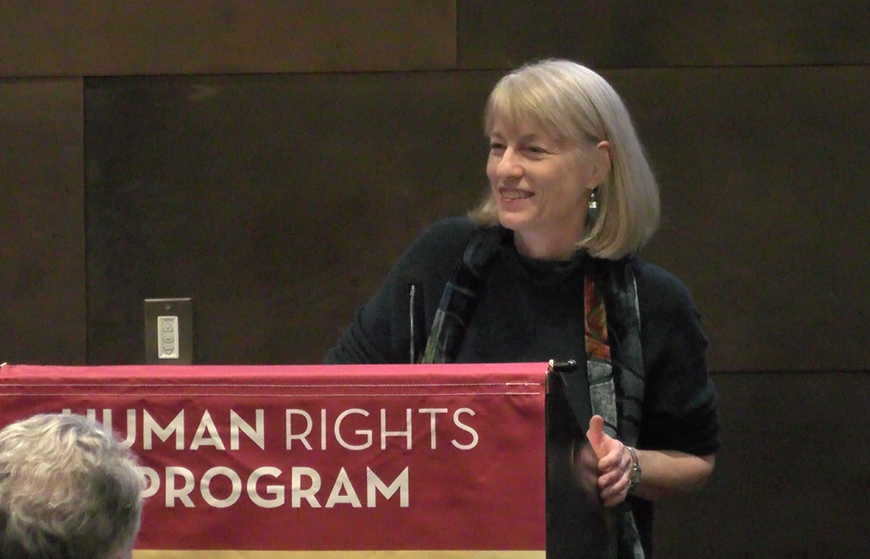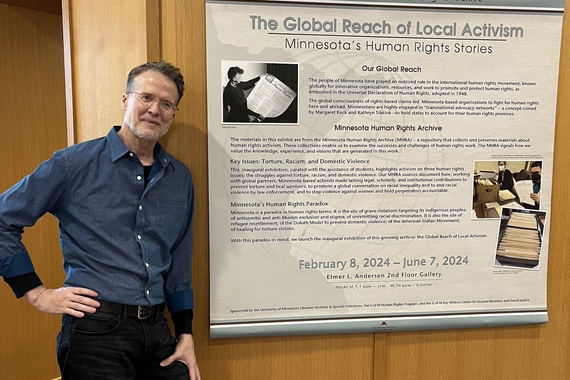A Hopeful Evening
If you’re not hopeful, you’re not paying attention.
A regular and constant influx of news from around the world inundates us with negative information that causes – at least for many of us – a negative outlook. And this is the truth not only for the casual follower of current events. Eric Posner, law professor at the University of Chicago, posits in The Twilight of Human Rights Law that “there has been no marked decrease in human rights violations.” He continues, “The law doesn’t do much; we should face that fact and move on.”
On March 7, 2018, before an audience of one hundred plus, University of Minnesota Regents Professor Emerita Kathryn Sikkink recited these words of Eric Posner. The words stirred a room full of women and men passionate about human rights, but over the next hour Sikkink used empirical data to rectify the audience’s outlook and provide evidence for hope.
Sikkink, the Ryan Family Professor of Human Rights Policy at the Harvard Kennedy School of Government, spent the first half of her presentation addressing the Posner statement (and remarks of others with similar sentiments) with charts, slides, graphs, and the like to debunk Posner’s “inaccurate” position. Data tracking the frequency of wars, number of combat deaths, violence against civilians, episodes of genocide, usage of the death penalty, income inequality between countries, malnourishment, and infant mortality were all exhibited to demonstrate a downward trend.
While this is great news for the human rights movement, Sikkink was quick to note that causation is an extremely difficult thing to infer from such empirical data. Nonetheless, the downward trend of these global afflictions is dispositive of the inaccuracy of Posner’s statement.
Sikkink then went on to address the second, more interesting question for her: “What are the sources of this deep pessimism?”
One aspect of it, according to Sikkink, is the concept of “comparison to the ideal.”
“We have this big gap between our ideals, expressed in the law, and where we are. So, when you use ‘comparison to the ideal,’ of course you are going to be very pessimistic.” A social scientist with a fierce commitment to human rights advocacy, Sikkink says she prefers “empirical data and comparison, both quantitative and qualitative.”
Another reason for the pessimism? “The human rights movement is partly to blame.”
For each piece of human rights law that is ratified, the bar gets raised. And “as the bar keeps getting raised, the gap between the bar and our practice may seem bigger, when actually we have higher expectations rather than lower practice.”
So, the question becomes: how do we sustain our momentum in the face of pessimism and despair?
Sikkink says she is inspired by the words of Chicago community organizer Saul Alinksy, with whom Sikkink’s husband worked.
“Alinksy said, ‘In order to bring about social change, you need three things. You need anger, you need hope, and you need the belief you can make a difference.’ Anger is crucial, but it burns out very quickly. It can’t sustain for a long time, so you need hope, and you get hope from victories.” Sikkink continues, “And you don’t just need the belief you can make a difference, you need the knowledge of how people made a difference.”
The presentation ended with a brief, but critical proposal: “The crucial balance we have to strike is how to sustain our anger and [feelings of] injustice... with the use of history to give us hope and knowledge of how to make a difference in the world.”
Kathryn Sikkink’s exhaustive and thorough research can be read in full in her new book, Evidence for Hope: Making Human Rights Work in the 21st Century. Available here:
https://www.amazon.com/Evidence-Hope-Century-against-Humanity/d…



